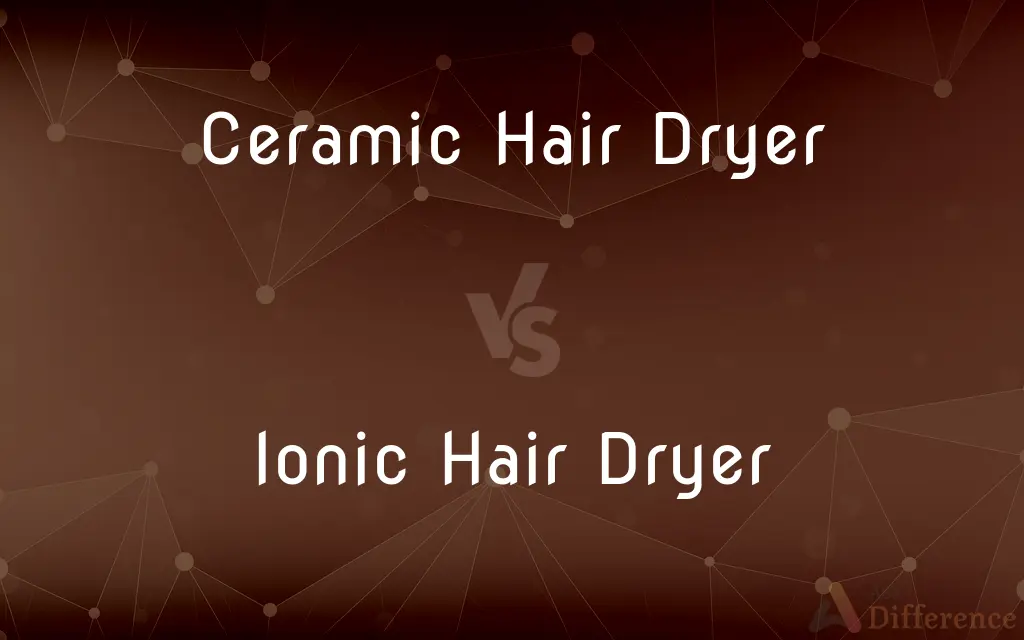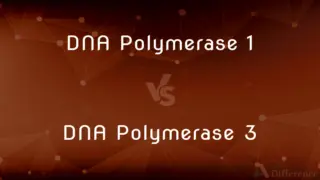Ceramic Hair Dryer vs. Ionic Hair Dryer — What's the Difference?
By Tayyaba Rehman — Published on December 2, 2023
A Ceramic Hair Dryer uses ceramic materials to produce consistent heat, while an Ionic Hair Dryer emits negative ions to reduce frizz and speed up drying. Ceramic focuses on even heat, Ionic on smoother, faster results.

Difference Between Ceramic Hair Dryer and Ionic Hair Dryer
Table of Contents
ADVERTISEMENT
Key Differences
A Ceramic Hair Dryer is primarily built with ceramic components which allow for an even distribution of heat, preventing hot spots that can damage hair. On the other hand, an Ionic Hair Dryer works by releasing negative ions that counteract the positive ions present in wet hair, which helps reduce frizz and static.
The primary advantage of using a Ceramic Hair Dryer is its ability to maintain a consistent temperature. This ensures that the hair dries uniformly without causing undue damage. The Ionic Hair Dryer, however, boasts of its capability to seal the hair cuticles, leaving the hair looking smooth and shiny.
Another distinction lies in drying time. While a Ceramic Hair Dryer offers consistent heating, an Ionic Hair Dryer can often dry hair faster due to the breakdown of water molecules by the emitted negative ions. This results in a shorter drying time and less exposure to heat.
While both types of hair dryers aim to minimize hair damage, they operate on different principles. The Ceramic Hair Dryer emphasizes temperature consistency, ensuring hair is not exposed to potential hot spots. The Ionic Hair Dryer focuses on enhancing the hair's natural shine and reducing frizz by balancing ion levels.
Comparison Chart
Heating Material
Uses ceramic materials.
Doesn't rely on ceramics.
ADVERTISEMENT
Drying Principle
Distributes consistent heat.
Emits negative ions to break down water molecules.
Main Benefit
Consistent temperature prevents hair damage.
Reduces frizz, adds shine, and speeds up drying.
Drying Time
Generally consistent.
Often faster due to ionic technology.
Hair Finish
Smooth, but may not be as shiny.
Typically shinier and less frizzy.
Compare with Definitions
Ceramic Hair Dryer
A hair drying device that emphasizes safety and reduced hair damage.
Opt for a Ceramic Hair Dryer if you want to minimize potential hair damage.
Ionic Hair Dryer
Focuses on reducing frizz and adding shine by sealing hair cuticles.
For that extra shine, I always rely on my Ionic Hair Dryer.
Ceramic Hair Dryer
A tool designed for consistent temperature maintenance during hair drying.
With a Ceramic Hair Dryer, you don't have to worry about fluctuating temperatures.
Ionic Hair Dryer
A dryer emitting negative ions to counteract positive ions in wet hair.
The Ionic Hair Dryer left my hair feeling smooth and frizz-free.
Ceramic Hair Dryer
A dryer that uses ceramic materials to ensure even heat distribution.
The Ceramic Hair Dryer ensures there are no damaging hot spots while drying.
Ionic Hair Dryer
Known for its ability to make hair appear healthier and smoother.
My hair has never looked better since I started using the Ionic Hair Dryer.
Ceramic Hair Dryer
Offers hair drying without the risk of overheating sections of hair.
The Ceramic Hair Dryer's even heating means no section of my hair gets overheated.
Ionic Hair Dryer
Designed to reduce hair drying time through ionic technology.
I saved time this morning thanks to my Ionic Hair Dryer.
Ceramic Hair Dryer
Known for its ability to deliver uniform heating.
The Ceramic Hair Dryer distributes heat evenly across my hair, reducing potential harm.
Ionic Hair Dryer
Enhances the hair's natural luster by balancing its ion levels.
The Ionic Hair Dryer restores the natural brilliance of my locks.
Common Curiosities
Why choose a Ceramic Hair Dryer?
Choose a Ceramic Hair Dryer for consistent heating and reduced risk of hair damage.
What does an Ionic Hair Dryer do?
An Ionic Hair Dryer releases negative ions, reducing frizz, enhancing shine, and often speeding up drying time.
Which is better for reducing hair damage: Ceramic Hair Dryer or Ionic Hair Dryer?
Both aim to reduce damage, but Ceramic Hair Dryers focus on even heat while Ionic Hair Dryers target frizz and faster drying.
Does a Ceramic Hair Dryer take longer to dry hair?
While a Ceramic Hair Dryer provides even heat, an Ionic Hair Dryer might dry hair faster due to its ionic technology.
What is a Ceramic Hair Dryer?
A Ceramic Hair Dryer uses ceramic materials to produce consistent heat, ensuring even drying.
Do Ionic Hair Dryers make hair shinier?
Yes, they help seal hair cuticles, often resulting in shinier and smoother hair.
Can a Ceramic Hair Dryer help with frizzy hair?
While it provides even heat, an Ionic Hair Dryer is specifically designed to combat frizz.
Which dryer is quieter: Ceramic Hair Dryer or Ionic Hair Dryer?
Noise level varies by model and brand, not necessarily by technology type.
Is an Ionic Hair Dryer suitable for all hair types?
Generally, yes, but those with particularly frizzy hair might benefit most from its smoothing effects.
How does a Ceramic Hair Dryer prevent hair damage?
It ensures even heat distribution, avoiding potential hot spots that can harm hair.
Can I get both ceramic and ionic features in one hair dryer?
Yes, many modern hair dryers combine both ceramic and ionic technologies for optimal results.
Is it safe to use a Ceramic Hair Dryer daily?
Yes, its consistent heat distribution makes it suitable for regular use, but always use heat protectant products for added protection.
Why might someone prefer an Ionic Hair Dryer?
An Ionic Hair Dryer can reduce frizz, add shine, and often reduce drying time.
Are Ceramic Hair Dryers more expensive than Ionic Hair Dryers?
Price varies by brand and features, but both can range from affordable to high-end.
Can using an Ionic Hair Dryer reduce my need for hair products?
It can reduce frizz and increase shine, potentially reducing the need for certain styling products.
Share Your Discovery

Previous Comparison
DNA Polymerase 1 vs. DNA Polymerase 3
Next Comparison
Pre Owned Gamestop vs. Refurbished GamestopAuthor Spotlight
Written by
Tayyaba RehmanTayyaba Rehman is a distinguished writer, currently serving as a primary contributor to askdifference.com. As a researcher in semantics and etymology, Tayyaba's passion for the complexity of languages and their distinctions has found a perfect home on the platform. Tayyaba delves into the intricacies of language, distinguishing between commonly confused words and phrases, thereby providing clarity for readers worldwide.













































